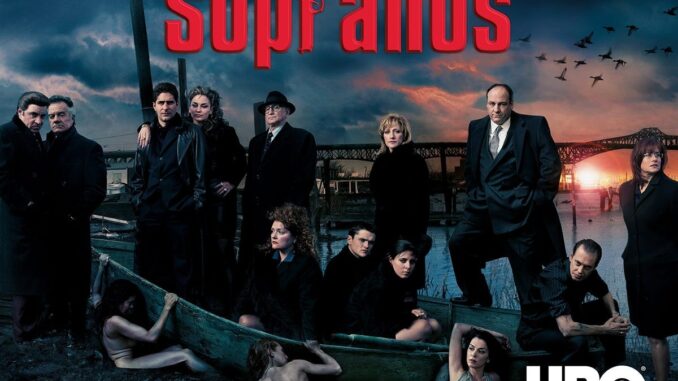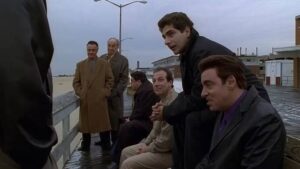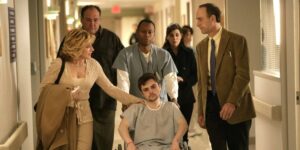
Make no mistake: The Sopranos could be an incredibly funny show, and leaned particularly close to comedy in its earlier seasons. The whole premise of The Sopranos can be compared to that of Analyze This, a movie released in 1999 that was a broad comedy and also revolved around a powerful mafia member going to therapy as a way to deal with a series of panic attacks.
That idea has comedic potential, clearly, and The Sopranos also has plenty of side characters who have amusing one-liners or otherwise exhibit moments of incredible stupidity that prove funny (heavily flawed characters are easier to laugh at, after all, and The Sopranos is filled with such people). But the show was also a crime-drama, and one that was willing to get brutally heavy when it wanted to, especially in the last couple of seasons. Some of the episodes that represent The Sopranos at its darkest are ranked below, starting with the grim and ending with the most harrowing.
10 “Whitecaps” (2002) Season 4, Episode 13

“Whitecaps” concludes the fourth season of The Sopranos in a dramatic fashion, notably doing so without anything by way of major character deaths, those naturally being an effective way of packing a dramatic punch. Instead, this critically acclaimed episode is focused on the “death” of Tony and Carmela’s marriage, representing the point where the latter finally grows tired of the former’s affairs and seeming incapacity to change for the better.
There is a reconciliation toward the end of season 5 between the pair, but that doesn’t lessen how intense the arguments are in “Whitecaps,” and how monumental it feels in relation to the family side of the show’s narrative. Though the crime/gangster element is always there, The Sopranos is also just as much about Tony’s family life as his criminal life, and as far as episodes that focus on his true family rather than his criminal family go, “Whitecaps” is the most dramatic.
9 “Members Only” (2006) Season 6, Episode 1
All bets are off when it comes to the final season of a show like The Sopranos, which is immediately apparent from season 6’s opening episode, “Members Only.” Part of this comes from the way it puts the spotlight on a previously rather minor character, Eugene Pontecorvo, giving him a tragic end after “Members Only” shows him try – and fail – to make a break from the mob life.
Also, while some of Uncle Junior’s lapses in memory had been played for laughs in earlier seasons, here, there are severe consequences explored, as he’s succumbed to dementia to the point where he mistakes his own nephew, Tony, for an old rival, and shoots him, almost fatally. Tony spends the next few episodes either in a coma or slowly recovering, with it being the closest the main character comes to death (well, depending on how you interpret that scene in the finale).
8 “Kennedy and Heidi” (2007) Season 6, Episode 18
As The Sopranos descended into darker territory thematically and narratively in the final seasons, so too did Tony himself become more and more morally compromised. Naturally, he’s at his worst (generally speaking) in season 6, demonstrated quite effectively in many episodes, including “Kennedy and Heidi,” which is the fourth-last of the entire series.
You can debate Tony’s motivations for killing Christopher, charitably saying he did so because he crashed his vehicle in a way that would’ve killed his infant child, had she been in the vehicle, or less charitably saying he did so because Christopher had become a liability. Perhaps it was a bit of both. But the scene is itself full-on, and the way Tony spends the rest of the episode unfazed and even relieved about the whole situation is undoubtedly dark.
7 “Funhouse” (2000) Season 2, Episode 13

“Funhouse” is an episode that holds up especially well upon rewatches, given how jam-packed it is with symbolism, creative cinematography, and series-defining events. It’s also a grim and rather sad episode, which can admittedly make the notion of enjoying it again a little difficult. It builds dread in a way that wouldn’t be surpassed – or even equaled – until later episodes, like season 5’s penultimate one and a handful of episodes from the grim final season.
Essentially, “Funhouse” is an episode dominated by intense fever dreams that Tony suffers due to food poisoning, with one eventually confirming to him that his associate and close friend, Salvatore “Big Pussy” Bonpensiero, is an informant. And, in the mafia world, informing is unforgivable and punishable by death, with “Funhouse” showing the build-up to Big Pussy’s demise in an unflinching, harrowing, and bleak fashion.
6 “The Blue Comet” (2007) Season 6, Episode 20

Speaking of people dying in The Sopranos, “The Blue Comet” is an episode infamous for featuring the murder of Bobby Baccalieri, who’s arguably the most likable member of Tony’s crew, or at least the mobster in the show with the most redeeming qualities and gentle traits. He’s a victim of the gang war that explodes between Tony’s crew and Phil Leotardo’s, and is gunned down before he has a chance to fight back or even react.
But he’s not the only casualty, given Silvio’s also attacked and put in a coma he might never have woken up from (this is the penultimate episode, so it’s hard to know for sure). Things end with Tony alone, given Christopher, Bobby, and (probably) Silvio are gone, with “The Blue Comet” concluding with an ominous scene of him in a darkened safe house, clutching a rifle Bobby had given him earlier in the season.
5 “University” (2001) Season 3, Episode 6
It’s a testament to The Sopranos that it was able to craft one of its saddest and most shocking episodes around a character who was introduced and then exited the show all in a single episode. That character was Tracee, and the episode was “University,” which contrasts the college life of Tony’s daughter, Meadow, with the harrowing and downbeat existence of Tracee, who’s a pole dancer at the Bada Bing, where Tony’s crew often hang out and conduct business.
She’s involved with Ralph Cifaretto, who’d done some awful things before “University,” but reaches a new low here, mistreating Tracee terribly and eventually beating her to death, all while she’s pregnant with his child. He does this in front of others, too, but doesn’t face immediate repercussions, given he’s a made man. Tony murders Ralph during season 4, likely for Tracee’s death and other things (Ralph is truly awful), but seeing him do such a thing and then have life go on, essentially, by the episode’s end is truly despairing.
4 “The Second Coming” (2007) Season 6, Episode 19

“The Second Coming” rivals “Whitecaps” when it comes to eventful episodes about Tony and his family, given this season 6 episode sees Tony’s son, A.J., fall into a deep depression not dissimilar to Tony’s depressive episodes. He attempts to take his own life, and is only saved by Tony being at the right place at the right time, and then being placed under psychiatric care in a ward.
Tony’s grief over seeing his child have the same struggles he’s had proves rather heartbreaking, even with the knowledge of all the bad things Tony’s done. Further, “The Second Coming” also gets dark in other ways (unlike “Whitecaps”), with the tensions rising between Tony and Phil, and a particularly brutal scene showing the former curb-stomping Coco, an associate of the latter, after he creepily hits on Tony’s daughter.
3 “Long Term Parking” (2004) Season 5, Episode 12
While “Long Term Parking” is an essentially perfect episode of The Sopranos, it’s also one of the grimmest the show ever had. There was a tragic element to the deaths of characters like Big Pussy and Bobby, sure, but neither were as innocent and good-natured as Adriana, Christopher’s long-suffering partner whose status as an FBI informant becomes known to Tony’s crew in this episode, spelling her doom.
It’s a death scene that still stings 20 years on from when the episode first aired, especially because there’s a short scene of Adriana seemingly driving off free, only for a cut to reveal it to be a fantasy sequence, in effect, and in actuality, Silvio is driving her into the woods to execute her. You could argue the heart of The Sopranos disappears for good in “Long Term Parking,” and it paves the way for further bleakness and despair to occur throughout the sixth and final season.
2 “Made in America” (2007) Season 6, Episode 21
Though the gang war started in “The Blue Comet” effectively concludes in “Made in America,” and the only on-screen death is a cathartic one, the episode is still about as dark as The Sopranos gets. The finale serves as an effectively empty and somber epilogue for the show, in effect, given how few main characters are left and how tense everyone remains, even with the main conflict seemingly being over.
Tony ties up some loose ends, but the absence of loose ends to tie up is also felt; it proves eerie, again, because there just aren’t many people left. Silvio’s last seen in a coma, Janice is left grieving Bobby, and Tony’s final scene with Junior – now in a grim-looking state facility – is heartbreaking. And, admittedly, even Phil’s death, while somewhat satisfying and deserved, does have an inherent darkness to it, given he’s executed in front of his wife and infant grandchildren, and his head ends up getting run over by his vehicle. And that’s before getting to the ominous and possibly deadly final scene of “Made in America” that infamously – and boldly – concluded the entire series.
1 “Employee of the Month” (2001) Season 3, Episode 4

While the final seasons have the most dramatic episodes concerning the overall narrative of The Sopranos, season 3, thanks to both “Employee of the Month” and the aforementioned “University,” has potentially the most upsetting standalone episodes. “University” has at least some effect on the future of the show (namely, Ralph’s eventual death), but “Employee of the Month” is particularly downbeat and bleak because its events aren’t as explicitly addressed again, and because it lacks traditional closure.
Tony’s therapist, Dr. Melfi, is attacked and raped in a horrific scene that proves arguably the hardest to watch in the show’s whole run. She recognizes that Tony, if told, would be able to enact justice upon the attacker that the law wasn’t able to (she learns the man’s name, at one point), but makes the decision not to tell him. Though Melfi feels telling Tony would be crossing a line, it’s still painful to know the perpetrator gets away with it, much like Ralph (initially) gets away with his horrific crime against a woman. “Employee of the Month” is a pivotal, emotionally intense, and exceptional episode that presents a compelling moral dilemma, but the graphic nature of it and that intentional lack of satisfying resolution makes it debatably the darkest in the show’s entire 86-episode run.
